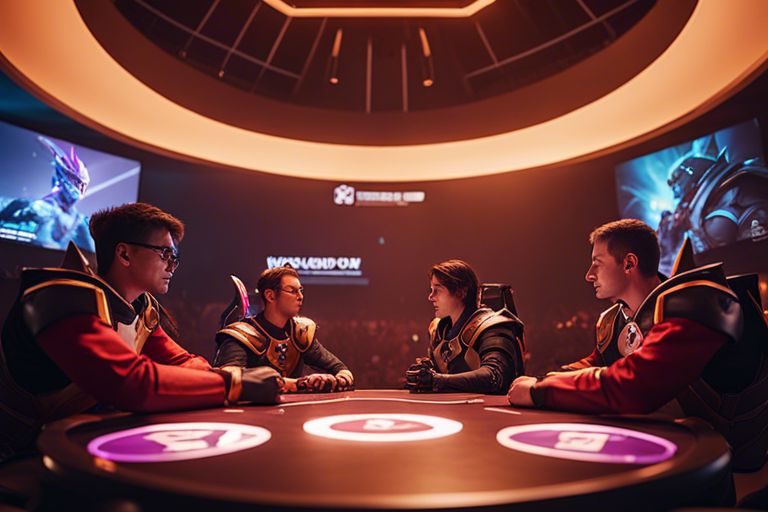Dynamics within a DOTA2 esports team can make or break their chances of success in the competitive scene. From communication to teamwork, individual skill levels, and strategizing, a team’s dynamics play a crucial role in their performance. In this blog post, we probe into the intricate dynamics that drive DOTA2 teams towards victory or defeat, uncovering the positive aspects that lead to synergy and collaboration as well as the dangerous pitfalls that can result in disarray and discord among teammates.
The Structure of Professional DOTA2 Teams
Roles and Responsibilities of Team Members
For a professional DOTA2 team to function effectively, each member must understand their role and responsibilities within the team. From the captain making strategic decisions to the support player ensuring the team’s survivability, every position is vital to their success.
The Evolution of Team Composition
With the constantly shifting meta and gameplay updates in DOTA2, the composition of professional teams has evolved over the years. Teams now focus on creating a well-rounded lineup that synergizes well and covers all aspects of the game, from early aggression to late-game domination.
To stay competitive, teams must adapt to the ever-changing landscape of DOTA2 by experimenting with different hero combinations and strategies. Teams that can effectively adapt and innovate have a significant advantage over their opponents, allowing them to stay ahead of the curve and secure victories.
Communication Strategies in DOTA2
In-Game Communication Tools and Tactics
Communication in DOTA2 is imperative for successful gameplay. Using in-game tools such as voice chat, text chat, and ping systems can help teams strategize effectively in real-time. Tactics like calling out enemy movements, coordinating ganks, and timing abilities can make a significant difference in winning matches.
Developing Effective Team Talk Outside the Game
InGame communication doesn’t stop when the game ends. To enhance team cohesion, it’s crucial to have effective communication outside of matches. This includes debriefing after games, discussing strategies, sharing feedback constructively, and setting goals for improvement. Building strong relationships and trust among team members can lead to better synergy and performance in future games.
The synergy and coordination among team members off the battlefield can significantly impact their performance in-game. By fostering a positive and respectful environment for open communication, teams can address issues, adapt strategies, and grow together. Encouraging regular team meetings, individual check-ins, and team-building activities can strengthen bonds and enhance overall team dynamics.
Psychological Dynamics of Esports Teams
Managing Stress and Emotions During Competition
Keep a cool head to succeed in the high-pressure world of esports. Emotions can run high during intense competitions, but it is vital for players to manage stress and keep their emotions in check. Maintaining focus and composure under pressure is crucial for making quick and precise decisions, which can ultimately make or break a match.
The Role of Team Chemistry and Trust
For a successful esports team, competition goes beyond individual skill – it relies heavily on the collective synergy of the team. Building trust and fostering strong team chemistry are paramount in creating a cohesive unit. When teammates trust each other and communicate effectively, they can anticipate each other’s moves and work together seamlessly towards victory.
The Impact of Coaching and Support Staff
From Strategy to Mentality: How Coaches Influence Team Dynamics
Impact: Not just mere figureheads, coaches play a pivotal role in shaping the team’s performance on and off the stage. They are responsible for devising strategies, analyzing opponents’ gameplay, and improving the team’s overall mentality. By understanding each player’s strengths and weaknesses, coaches tailor strategies and instill a winning mindset that can make all the difference in high-stakes matches.
The Integral Role of Analysts, Trainers, and Managers
On: The backbone of any successful esports team lies in the unseen contributors such as analysts, trainers, and managers. Analysts pore over intricate game data, scouting reports, and player statistics to provide valuable insights to the team. Trainers work diligently behind the scenes to keep the players physically and mentally sharp, ensuring peak performance during crucial moments. Managers handle the logistics, scheduling, and team morale, creating a supportive environment for players to focus on their game.
To wrap up
Team dynamics are the unseen foundation of success in DOTA2 esports. Communication, trust, roles, and adaptability are crucial elements that when aligned, pave the way for victory. Understanding and addressing the dynamics within a team can lead to better performances and ultimately, more wins. By recognizing the nuances of team talk, and actively working on fostering positive dynamics, teams can enhance their gameplay and create a strong competitive edge. Teamwork truly does make the dream work in the world of DOTA2 esports.




